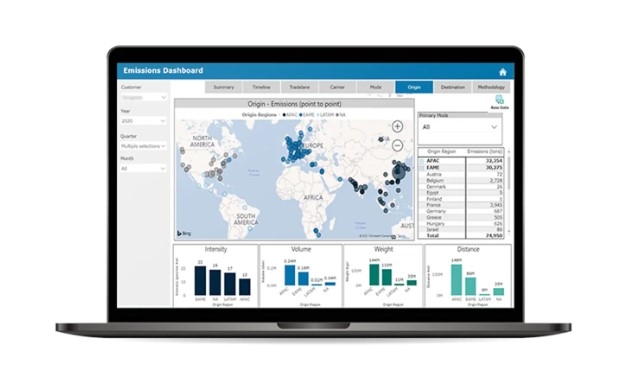
Carbon footprint visibility platform promote sustainable logistics
Mar, 14, 2023 Posted by Gabriel MalheirosWeek 202314
Logistics facilitates global trade and is critical to business growth in any industry. However, according to an investigation carried out by the Brazilian Development Bank (BNDES) in 2021, cargo freight is the primary source of greenhouse gas emissions in Brazil. The logistics industry accounts for 21% of total global carbon dioxide emissions.
In contrast, Latin Americans’ worry about climate change is among the highest in the world, according to OECD’s Latin American Economic Outlook 2022: Towards a Green and Just Transition report. On average, 68% of respondents recognize climate change as a dire threat for the next 20 years, and 55.8% defend that the environment should be a priority and agree with the idea that the government and companies – and not just individuals – should make efforts towards sustainability and environmental preservation. Globally, on average, the top environmental priorities are global warming, air pollution, and waste management.
This growing awareness has led consumers to choose ecologically responsible products, demanding more information to assess the sustainability of the global supply chain and the products they buy, as well as the sustainability of the raw materials used, the conditions in which they were produced, and their logistics. In addition, there is intense pressure from regulators, investors, and new green supply chain laws to adopt more sustainable measures and advertise sustainability strategies, initiatives, and results.
Although there is greater awareness and willingness on the part of companies to undertake the necessary sustainable actions, there are still some challenges. In infrastructure, for example, despite the support for sustainable initiatives, there are not always facilities equipped to use green fuels, vehicles, equipment, etc. Costs are also higher, such as the price of biofuels compared to conventional fuels, and, lastly, the lack of a global industry benchmark on the green supply chain.
Faced with these challenges, an alternative, according to Eric Domínguez, director of Logistics Solutions at Maersk Latin America, is digitalization, which can optimize costs, time, and efforts through accurate data analysis.
“Many companies are looking for accurate carbon footprint analysis to help them optimize investments and ensure their chosen sustainability strategy has the most significant impact possible. Most supply chains are fragmented and, therefore, very complex due to the increasing number of stakeholders. And our goal is to ensure full visibility for them to take advantage of their journey towards decarbonized supply chains,” explains Eric.
Emission Dashboard
Currently, Maersk uses the Emissions Dashboard platform, which makes visible carbon footprints throughout the chain and commercial channels. This has been a vital alternative to increase sustainability in Europe by optimizing digitalization and is a platform that consolidates emissions data from all carriers, whether Maersk or third parties. Additionally, the platform follows an industry-leading calculation method that meets the regulations of the Global Logistics Emissions Council (GLEC).
“There is an enormous amount of data available at the click of a button and the challenge is to bring this data together into a cohesive analysis that facilitates decision-making and action, and that is exactly what the platform offers,” points out Raj Tiwari, Director Global Supply Chain at UPL.
Raj further explains that sustainability platforms give companies better control over the supply chain and can also be used to gain deeper insight into where the sustainability gaps lie. “With this greater level of transparency, it is possible to implement smart sustainability strategies and achieve science-based goals, reducing costs and improving results.”
-
Other Cargo
Aug, 18, 2023
0
Brazilian wine exports show steady growth in first half of 2023
-
Other Cargo
Feb, 14, 2021
0
Brazilian peanut exports up 38% in 2020
-
Shipping
Jul, 21, 2022
0
Mega containerships may be reaching size limit accommodated by ports
-
Sugar and Ethanol
Nov, 04, 2020
0
Brazil exports a record 4.2m tons of sugar in October


